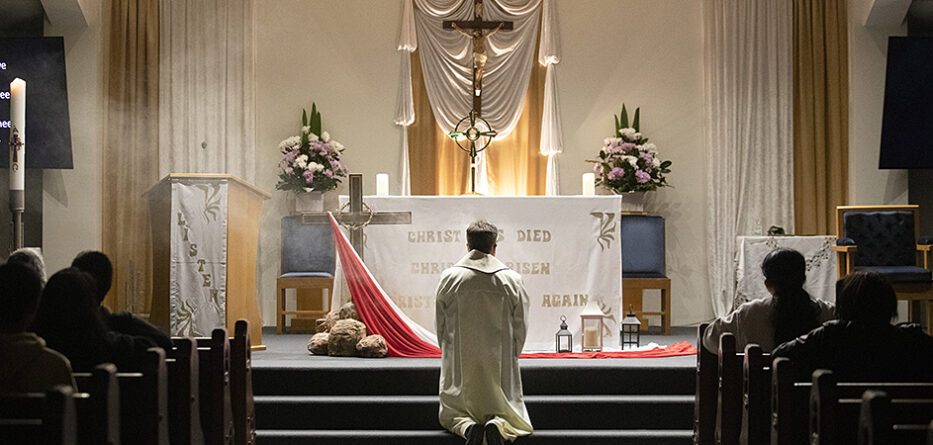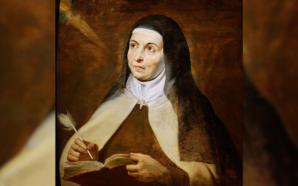The origins of the adoration of the Blessed Sacrament are to be found in the early Middle Ages. But it is clear from liturgical history that having the Eucharist available outside of the celebration was common. The practice of reserving the Eucharist for the sick is very ancient and is referenced in the First Apology of St Justin Martyr written between 155-147 AD.
With the official recognition of the Christian faith in the fourth century, reservation took place initially in the sacristy of church buildings where the Blessed Sacrament could be accessed readily by the clergy. It was in the Middle Ages that the Eucharist began to be placed in church buildings and it was reserved in a number of different ways including a hanging pyx (the container used to hold the Eucharist), often in the form of a dove, and sometimes in what was an aumbry (a recess with a door in the wall which also could be used for the keeping of the Sacred Oils as well).
But it was in the 11th century in France that the practice of Eucharistic Adoration began. This was a time when many of the faithful wanted to adore the consecrated Host outside of the celebration of Mass. Thus, in the 13th century, the Feast of Corpus Christi was established in 1264 and led to its observance all over Europe being held on the Thursday after the Feast of the Trinity with outdoor processions, often very elaborate, across the towns and villages of Christian Europe.
The custom of keeping vigil before the Blessed Sacrament became especially popular a few centuries later, during that period of history we refer to as the Counter Reformation when the looting of churches was common, and desecration often occurred. The faithful believed it was important to guard the Eucharist in a volatile age. It was from the time of the Counter Reformation and St Bonaventure that Tabernacles were installed on the altar in church buildings throughout Europe and the rest of the world.
From the 17th century, and throughout the 18th and 19th centuries, a number of religious congregations of both men and women were established where devotion and adoration to the Blessed Sacrament was core to their mission and identity. It was said at the time that it was hard to know how many congregations of religious existed which were dedicated to adoration of the Eucharist.
After the Second Vatican Council, devotion to the Blessed Sacrament began to wane (quite possibly because of the greater frequency of people receiving Holy Communion) but began to rise to in popularity again during the Pontificate of St John Paul II. Around the world now, there are many chapels and places where Eucharistic Adoration is available 24 hours a day.
Making a decision to spend time in Eucharistic Adoration can and does bring many benefits. Whilst every baptised person is called to a life of prayer, to pray before the Blessed Sacrament provides an opportunity to be close to the person of Christ in a most tangible way. Because Catholics believe in the Real Presence of Christ in the Eucharist, a person is able to focus on the Eucharistic Christ either in a Monstrance, or in the Tabernacle, and this should heighten the desire to not only participate in the Eucharist, but also to live a Eucharistic life – a life broken and poured out in the service of others, just as Christ also gave His life, and His blood was poured out for the life of the world.
Eucharistic Adoration is not only the act of piety by an individual, but also an ecclesial action, as we are also linked to other members of the Church who also choose to engage in the same act of Adoration. In one way we could say that when you love someone you want to spend time with them and be close to them. Eucharistic Adoration provides the same experience for those who love Christ and want to be close to Him.
As the Rite of Eucharistic Worship outside of Mass states:
“…the devotion prompting the faithful to visit the Blessed Sacrament draws them into an ever deeper share in the Paschal Mystery and leads them to respond gratefully to the gift of Him who through His humanity constantly pours divine life into members of His Body. Abiding with Christ the Lord, they enjoy His intimate friendship and pour out their hearts before Him for themselves and for those dear to them, and they pray for the peace and salvation of the whole world. Offering their entire lives with Christ to the Father in the Holy Spirit, they derive from this sublime colloquy an increase in faith, hope and charity. Thus, they foster those right dispositions that enable them with due reverence to celebrate the memorial of the Lord and receive frequently the bread given us by the Father.”
Very Rev Peter G. Williams AM is the Vicar General and Moderator of the Curia in the Diocese of Parramatta.
This article was originally published in the 2024 Ordinary Time | Winter edition of the Catholic Outlook Magazine. You can read the digital version here or pick up a copy in your local parish.








